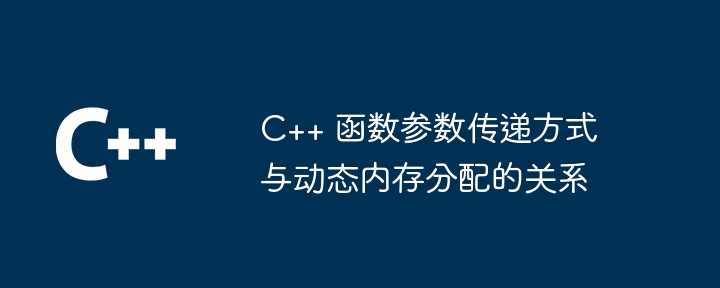
In C, the function parameter passing method affects the function's processing and access of parameter data. Passing by value does not affect the actual parameters, while passing by reference and passing by pointer allow the function to modify the value of the actual parameter. Dynamic memory allocation allocates heap memory at runtime through the new and delete operators, and it is important to understand how this relates to how parameters are passed.

C The relationship between function parameter passing methods and dynamic memory allocation
In C, function parameters can be passed in the following three ways Passing:
Dynamic memory allocation refers to applying for memory space on the heap at runtime. It can use the new and delete operators to create and release objects.
It is important to understand the relationship between function parameter passing methods and dynamic memory allocation, because it affects how the function handles and accesses parameter data.
Practical case
Consider the following example:
#include <iostream>
using namespace std;
// 传值传递
void increment(int x) {
x++; // 对形参的改变不会影响实参
}
// 传引用传递
void increment_ref(int &x) {
x++; // 对形参的改变会影响实参
}
// 传指针传递
void increment_ptr(int *x) {
*x++; // 对形参的改变会影响实参
}
int main() {
int a = 10;
// 传值传递
increment(a);
cout << "After increment(a): " << a << endl; // 输出 10
// 传引用传递
increment_ref(a);
cout << "After increment_ref(a): " << a << endl; // 输出 11
// 传指针传递
increment_ptr(&a);
cout << "After increment_ptr(&a): " << a << endl; // 输出 12
return 0;
}Conclusion
The above is the detailed content of The relationship between C++ function parameter passing methods and dynamic memory allocation. For more information, please follow other related articles on the PHP Chinese website!
 What are the differences between c++ and c language
What are the differences between c++ and c language
 Recommended learning order for c++ and python
Recommended learning order for c++ and python
 Cost-effectiveness analysis of learning python and c++
Cost-effectiveness analysis of learning python and c++
 Is c language the same as c++?
Is c language the same as c++?
 Which is better to learn first, c language or c++?
Which is better to learn first, c language or c++?
 The difference and connection between c language and c++
The difference and connection between c language and c++
 C++ software Chinese change tutorial
C++ software Chinese change tutorial
 Cost-effectiveness analysis of learning python, java and c++
Cost-effectiveness analysis of learning python, java and c++




